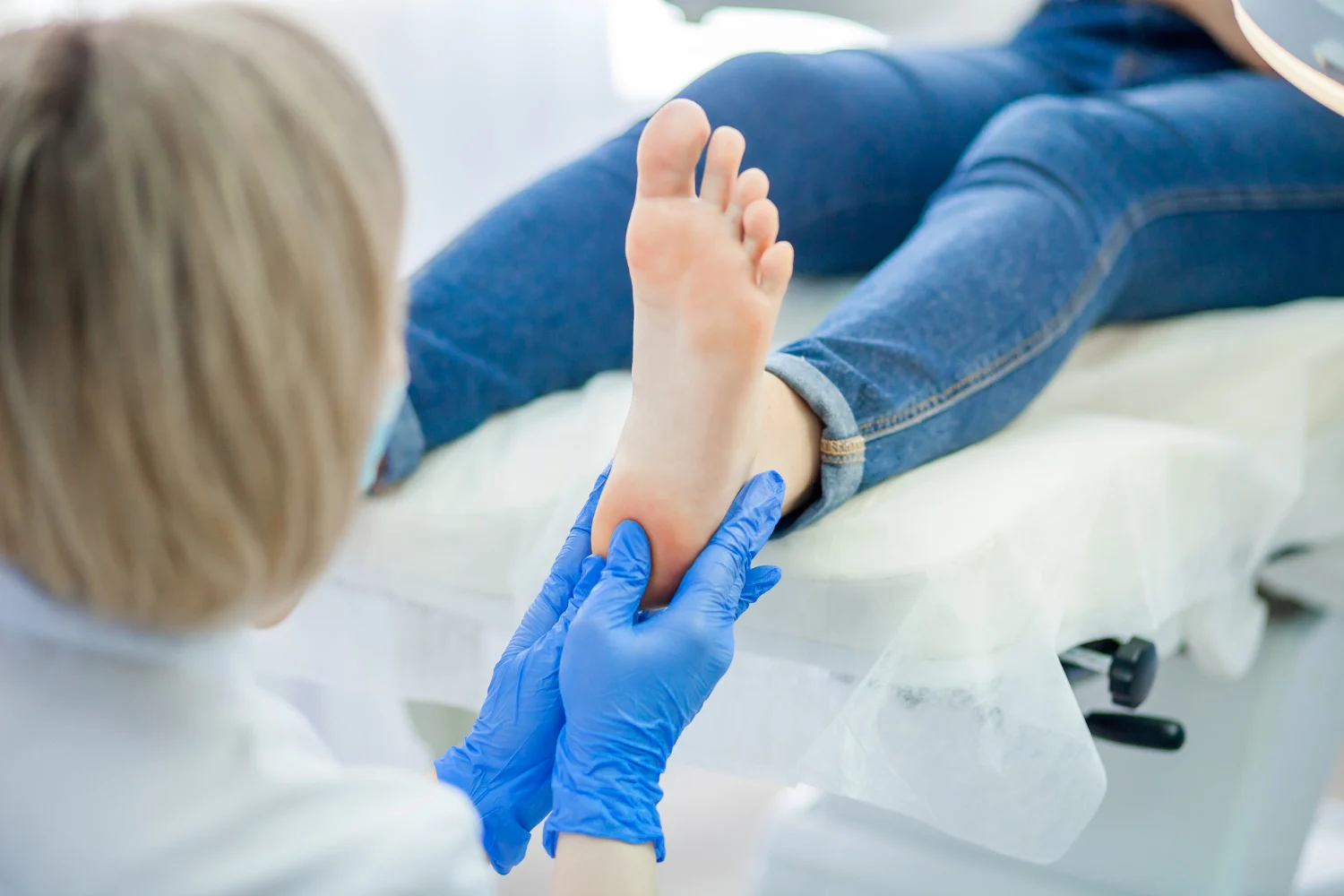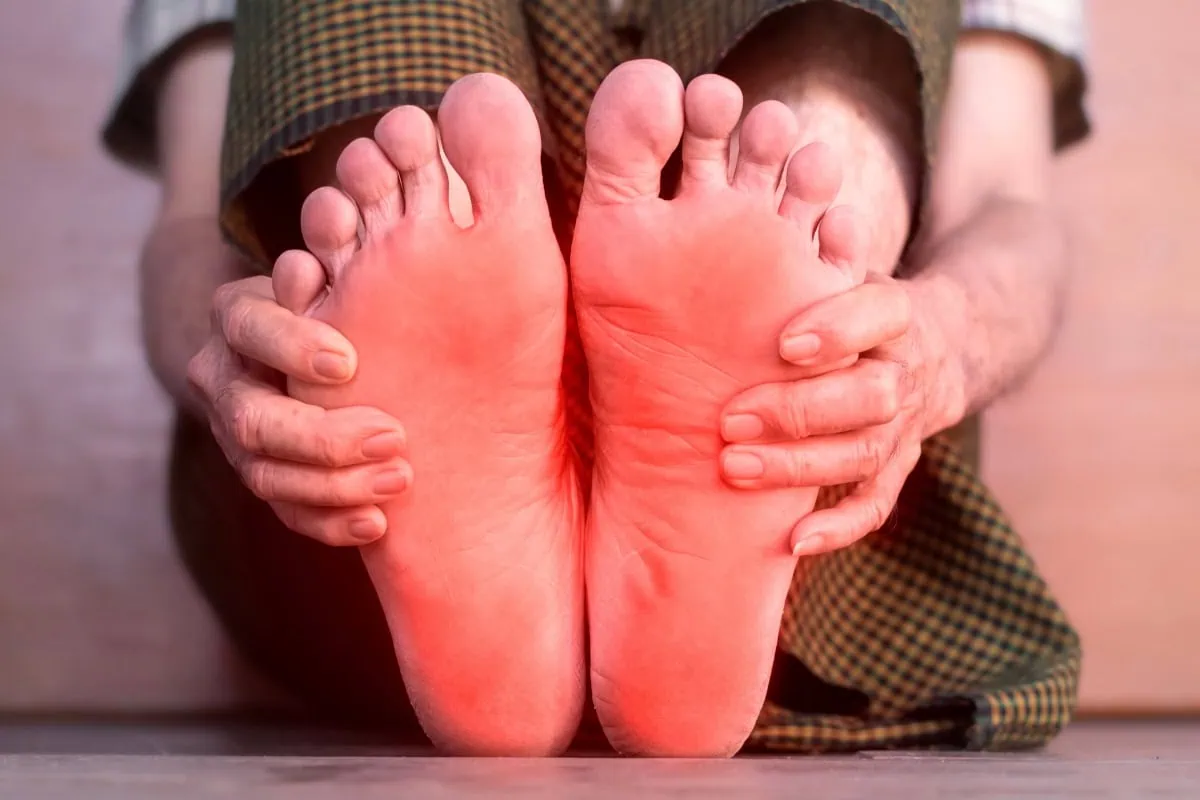
Diabetic Foot Care Neuropathy
Diabetic Neuropathy: A Silent Threat to Your Feet and Health
Diabetes affects over 29 million Americans—and for nearly 70% of them, nerve damage (neuropathy) becomes a painful and dangerous complication. At Anderson Podiatry Center, we specialize in identifying and treating diabetic neuropathy to protect your feet and improve your quality of life.
Neuropathy can cause tingling, burning, numbness, and loss of feeling in your feet. These symptoms often lead to balance issues, poor coordination, and difficulty walking. Even more concerning, numbness can prevent you from noticing cuts, blisters, or ulcers—injuries that, in diabetics, can quickly become serious due to reduced blood flow and poor healing. These complications dramatically increase the risk of infection and, in severe cases, amputation.
Our team of highly trained Colorado podiatrists is dedicated to providing expert foot care and advanced nerve treatments for diabetic patients. With years of focused training in neuropathy care, we go beyond traditional foot care to offer specialized solutions that address the root of the problem—not just the symptoms.
Don’t wait until a small problem becomes a serious one. Explore our diabetic foot care and neuropathy services to learn how we can help protect your feet—and your future.
Understanding Neuropathy
Neuropathy occurs when the nerves in your feet and legs become damaged or compressed—leading to symptoms such as burning, tingling, numbness, sharp pain, and difficulty with balance or walking.
At our state-of-the-art Nerve Pain Center—the first of its kind in the region—we use advanced diagnostic tools to accurately assess the extent and cause of your neuropathy.
Non-Surgical Treatment Options
Our Colorado podiatrists offer a variety of conservative, drug-free treatments that target the root of the problem:
• Nerve Blocks – For targeted pain relief.
• MLS® Laser Therapy – Deep-penetrating laser technology that promotes healing.
• Electrical Stimulation (ESTIM) – Helps repair damaged nerves in early-stage neuropathy or for patients who aren’t candidates for surgery.
When Surgery Is the Best Path Forward
If your neuropathy has progressed—causing all-day numbness, tingling, or muscle weakness that interferes with daily life—you may be a candidate for nerve decompression surgery, a groundbreaking procedure that relieves pressure on affected nerves.
• Highly Effective for Diabetic Neuropathy – Studies show an 80–90% success rate.
• Equally Effective for Non-Diabetic Neuropathy – Relief and restored function without relying on medication.
How Nerve Compression Causes Neuropathy
Dr. Lee Dellon, a pioneering neurosurgeon from Johns Hopkins University, discovered that tight anatomical spaces—like the inside of the ankle—can compress swollen nerves, especially in diabetic patients. This compression is a leading cause of neuropathic pain.
Two key factors make diabetic nerves more vulnerable:
1. Swelling – Elevated blood sugar draws water into nerves, causing them to swell and become pinched in narrow spaces.
2. Interrupted Protein Flow – Compressed nerves can’t properly transport essential nutrients, further impairing function.
By surgically releasing these compressed nerves, nerve decompression helps restore normal nerve function, reduce symptoms, and improve overall foot health and quality of life.

End the Cycle of Chronic Pain—Surgical Relief Starts Here
If you’ve been told there’s nothing more to be done for your nerve pain—think again.
At the Anderson Center for Nerve Pain, our nationally recognized team, led by Dr. Anderson and Dr. Aguila, is transforming lives with cutting-edge nerve surgery. As experienced Colorado podiatrists, we specialize in identifying the true source of your pain—not masking it with medications.
Through advanced, minimally invasive procedures, we help patients struggling with:
• Peripheral neuropathy and restless legs
• Post-surgical pain (knee, shoulder, or hernia-related)
• Pelvic or groin pain, including after childbirth
• Spine-related pain—without spine surgery
• Post-amputation pain
• Complex Regional Pain Syndrome
• Chronic migraines
• And more
Our surgical options include:
• Nerve Decompression Surgery – Relieves pressure from pinched nerves, restores function, and reduces pain.
• Nerve Resection Surgery – Removes the exact nerve branch causing pain without impairing movement.
Most procedures take just one hour, with immediate improvements in sensation and mobility. Many patients walk out the same day with less pain and more hope.
You’ve tried medications. You’ve tried everything.
Now it’s time to try what works.
Book your consultation today and discover how expert foot care and specialized nerve surgery can help you reclaim your life—when no one else could.

Charcot Foot: A Serious Diabetic Complication You Shouldn’t Ignore
Charcot foot (pronounced “sharko”) is one of the most severe and overlooked foot conditions affecting people with diabetes. It occurs when weakened bones in the foot fracture or disintegrate, leading to a collapse or deformity of the foot’s structure.
Because diabetic neuropathy often causes numbness, many patients continue walking on the injured foot without realizing it—causing further, often irreversible damage.
Early Warning Signs
Charcot foot is frequently misdiagnosed as an infection or gout. If you notice any of the following symptoms, it’s critical to seek help from a qualified foot care specialist:
• Warmth, redness, or swelling in the foot
• A sudden change in foot shape or arch
• Unexplained instability while walking
Treatment Options
As experienced Colorado podiatrists, the team at Anderson Podiatry Center offers advanced, compassionate care for Charcot foot. Treatment may include:
• Custom braces or diabetic footwear to stabilize and protect the foot
• Reconstructive foot surgery in severe cases to correct deformities and prevent further damage
At Anderson Podiatry Center, we’re committed to early diagnosis, innovative treatment, and patient education. Our team continuously trains in the latest advancements in diabetic foot care, neuropathy management, and surgical solutions—ensuring you receive the best care possible.
Don’t ignore the signs. If you or a loved one has diabetes and experiences foot changes, contact us today for an evaluation with a trusted Colorado podiatrist.

Struggling to Lift Your Foot? Discover What’s Behind Drop Foot and How to Treat It
Drop foot is a condition where you have difficulty lifting your foot and toes upward or moving your foot side to side. This can affect your ability to walk normally and increase your risk of falls.
What Causes Drop Foot?
Drop foot often results from compression of the common peroneal nerve, which runs through a narrow tunnel on the outside of your upper leg. This nerve compression is similar to carpal tunnel syndrome in the wrist.
Common causes include:
• Congenitally tight nerve tunnels
• Trauma or injury to the leg or knee
• Hip or knee replacement surgeries
• Diabetes
Effective Treatment Options
We provide cutting-edge surgical nerve decompression that directly targets and relieves nerve pressure, reversing the weakness caused by drop foot and restoring your freedom to move.
Countless patients reclaim their independence—walking without canes, exercising confidently, and dramatically reducing their risk of falls. For seniors, this breakthrough treatment can prevent devastating injuries like hip fractures and transform quality of life.
Don’t let drop foot hold you back any longer. Reach out to our expert Colorado podiatrists today and take the first step toward renewed strength and stability.

End Restless Leg Syndrome Now — Advanced Nerve Surgery Offers Lasting Relief
Restless Leg Syndrome (RLS) impacts nearly 10% of the U.S. population, causing uncomfortable sensations deep within the legs that can disrupt sleep and quality of life.
Symptoms
• Throbbing, pulling, creeping, or other unpleasant sensations in the legs
• An uncontrollable, often overwhelming urge to move the legs
• Symptoms typically worsen at night and usually affect both legs
Causes
While the exact cause of RLS remains unclear, nerve compression—particularly of the common and superficial peroneal nerves—is believed to play a significant role.
Treatment Options
Traditional treatments often rely on medications that manage symptoms but don’t address the root cause of RLS.
At Anderson Podiatry Center, our Colorado podiatrists offer advanced nerve decompression surgery as a groundbreaking solution. This minimally invasive procedure targets the two main nerve tunnels responsible for RLS symptoms, usually completed within 30 to 40 minutes.
Patients often experience relief soon after surgery, with many able to walk and move comfortably the very next day. Early clinical results show an impressive 80-90% success rate in reducing or eliminating symptoms.
Why Choose Us?
As leaders in foot care and nerve pain treatment, we’re committed to providing compassionate, expert care backed by ongoing research. We are dedicated to offering innovative, lasting relief for those struggling with restless leg syndrome.
If restless leg syndrome is impacting your life, don’t wait. Contact our Colorado podiatrists today to explore treatment options designed to restore comfort and improve your quality of life.

